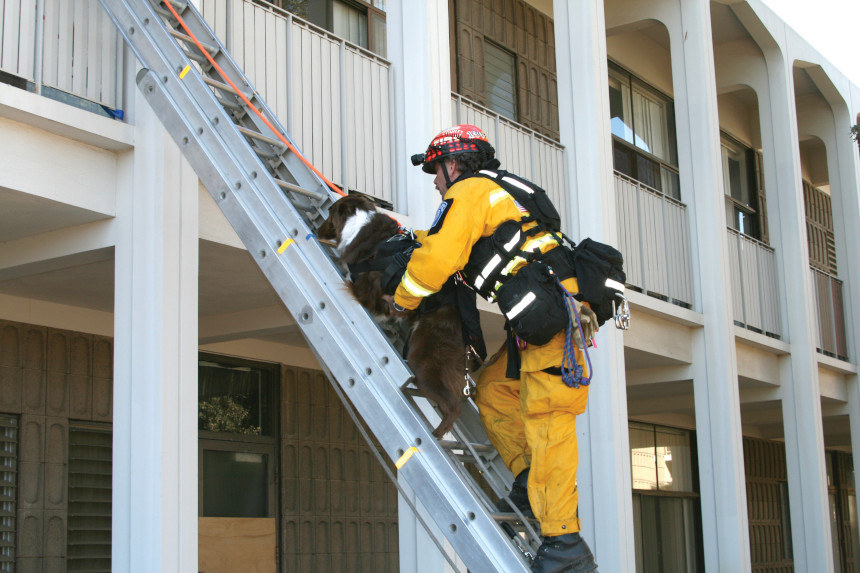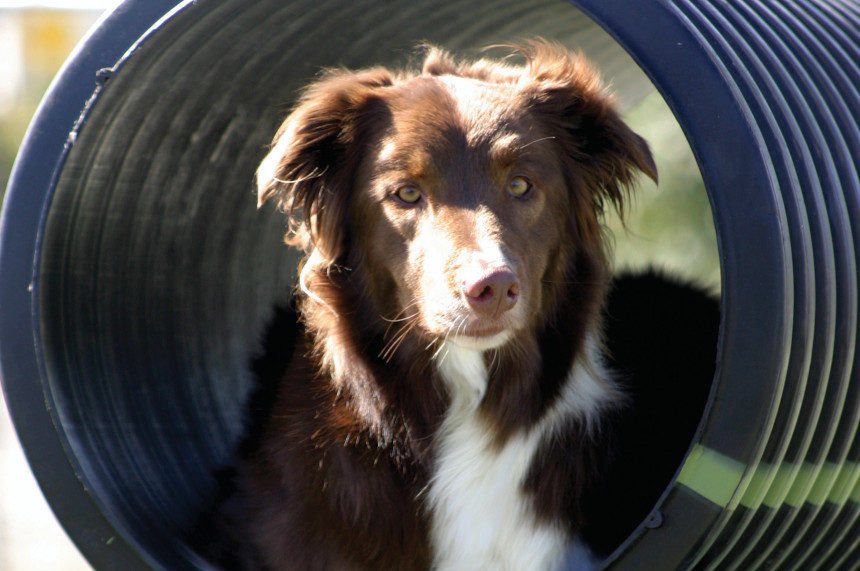The women sat in the dark and waited to die.
Almost three days earlier, as the heavy afternoon heat crept over Port-au-Prince, the massive earthquake had stolen the ground from beneath their feet. In terms of percentage of a country’s population killed, the earthquake was the most destructive natural disaster ever in modern history. The earth shook so violently, the artificial ground fill making up the foundation for much of the port took on the properties of a liquid. For almost 14 seconds, the firm ground became a quicksand-like trap, swallowing foundations and mercilessly toppling buildings. It turned an apartment where three young Haitian women resided into a prison of rubble. The prison would soon be a tomb.
Three days without food or water slowed the women’s shallow breaths with fatigue. There would be no escape under their own power. Like fighting a slowly constricting python, any struggle to push out would further collapse their cell. There would be no rescue from outside either.
The curtains of mangled concrete withheld any indication to passersby the collapsed apartment had spared anyone from the terrible fate that had claimed from 150,000 to 300,000 lives. At the time of the quake, Haiti was the poorest country in the western hemisphere, with half its population living on less than U.S. $1 a day. Disregard for building codes and regulations was commonplace. The resulting shortcuts left the majority of structures in the country well outside of what would be considered earthquake-safe construction.
International aid was beginning to trickle in, but the women’s apartment was just another rubble pile in an entire city of rubble. Lacking the ability to signal to the outside world that they were alive, it was unlikely they would be saved by the already overwhelmed relief effort. The women didn’t need help. They needed a miracle.
Landing lights pierced the night sky as the helicopter came in low over the palm trees. It was coming for one dog.
The craft from the Kern County emergency services in Southern California hovered for a moment, then set down next to Fire Captain Billy Monahan. Billy, who’d served almost 40 years in the fire service, knelt in an empty lot across from his house with the dog of the hour tight by his side as the rotor wash flattened the grass around them.
It was a fitting entrance for a border collie who in his seven years had earned a reputation as having a flair for drama. He boasted a flowing lion’s mane of copper fur, a snowy white underside, and a dollop of white just before the tip of his nose. This was Hunter.
He projected a regal grandeur, giving an air of importance that people couldn’t help but respect and admire.
Hunter wasn’t a large dog, but he projected the regal grandeur of royalty, giving an air of importance that people couldn’t help but respect and admire. Hunter loved attention. His chest would puff proudly. His mouth would crack into the bright canine smile of a movie star. By design or fortune (but probably his own design), Hunter always managed to put his best paw forward when the cameras came around.
On January 15, 2010, crammed in the back of a commandeered Chevy Blazer screaming across the fractured roads of Port-au-Prince, Hunter and Billy weren’t exactly traveling first class. Twenty-four hours after touching down in Haiti, Billy knew this was a different ball game. He and his loyal partner were about to face the biggest challenge of their long career.
The destruction in the Caribbean nation was beyond comprehension. Still today Billy recalls the enormous number of dead; the bodies that hung from windows and fractured hallways; the stacks of bodies lining the streets; the overwhelming and inescapable stench.
Billy tried to stay positive; his emotion transmitted up the leash to Hunter. He maintained the first responder’s subconscious hope for survivors, no matter how dire the situation looked on the surface. But they were nearing the 72-hour cusp since the disaster — the upper limit of the estimated timeframe a trapped human can survive without food, water, and proper medical attention.
Their first search of the presidential palace had turned up nothing but dead. Simple odds were they’d only find more bodies to add to the pile.
As the Blazer swung to a stop and opened its doors, Billy shook off the gnawing mental exhaustion and waded out into the thick humidity of the midday air, Hunter by his side. Time to focus — Hunter was up first, and the search did not look easy. What used to be an apartment was now a small mountain of rebar, trash, and jagged concrete chunks that stuck up like tombstones. The daunting size of the pile did little to raise spirits. Finding anything here would be difficult and dangerous.

Billy walked Hunter into position at the edge of the rubble and gave the small mountain another glance. No signs of life, but no time for doubt. There were an infinite number of sites to search, and that was barely scratching the surface. He looked down at his loyal partner. Hunter was sampling the air with his extraordinary nose and pulling the leash taut. No Hollywood drama here. The dog was ready to work.
Not knowing three lives were depending on what his dog did in the next five minutes, Billy unleashed Hunter and the search began.
Hunter sprang forward into air thick with scents of all types. A building collapse might dredge up buried odors or release trapped ones from within the walls, the building materials, or the surrounding ground, in addition to the scents that were already freely floating. Hunter was literally walking into a flood of smells. Except he wasn’t walking. He was bounding, bouncing from stone to stone like his feet were rubber. He bypassed a coil of razor wire, two metal chairs, and a broken window frame. Billy noticed his partner was picking up speed as he neared a jagged arrangement of broken concrete.
The concrete dropped into a crescent-shaped bowl of rubble. Billy tried to imagine the acrylic bubbles they would use in training to show air currents, floating across the remains of the structure. The air was hot here. Invisible thermals rose from different locations and would fling molecules off hard surfaces and send them ricocheting off in different directions, an ever-stirring pot of invisible stew. Or maybe not moving at all — sometimes scent gets trapped in buildings, especially thick concrete, and very little escapes.
A little extra pep in Hunter’s step was nothing to get excited about yet, but did warrant some extra attention. Hunter crested the berm and descended into the small depression. There were tiny crawl spaces, no more than a foot and a half, into which Hunter would scrunch himself. He would penetrate the rubble pile so far back that Billy could only see the bronze-circled reflection of his eyes before he popped back out again. Hunter was focused. All his training was coming through in his every movement.
Then it happened quickly. Hunter, who’d been running an even straight line, suddenly cut left like some invisible wire had snagged him. The official term for this is “hooked” and it literally looks like some offstage hook in a cartoon reaches out and pulls the dog in a different direction. Billy now had reason to get excited. Hunter was onto something.
Four stories below the surface, the three women still had no reason to hope. Any sounds of the search were unlikely to reach them. But their bodies were emitting dead cells from their skin, bacteria and organic matter in their breath, sweat from their pores, all of which could act like molecular rescue beacons for the sniffing machine circling above. As the molecules seeped out from the concrete, they hit more concrete; they mixed with the rest of the other scents — dirt and dust, rust and metal, bone and blood of the dead — diluting them, thinning them, masking them.
Billy felt a sharp tug and the weight f the water bottle was gone. Someone had grabbed it off the end of the stick. These people were alive.
Somehow — maybe a lucky ricochet, maybe a favorable breeze — some of those molecules made it into Hunter’s nose. The scent bounced through Hunter’s nostrils, into one of his three hundred million or more sensory receptor sites and lit up his brain to human scent. Live human scent.
Hunter’s search area grew smaller, more focused by the second. His body seemed to tighten. His tail began to wag. Billy felt his pulse uptick slightly, but he tried to remain detached until he was sure. In his 28 years involved with the Los Angeles Urban Search and Rescue Task Force, he had never been able to pull anyone out alive.
Then Hunter’s search area was only a few square feet, focusing on nothing more than a tiny gap in the concrete. He had something. Billy was certain of that now. But was it alive? Then Hunter stopped. Whatever he was interested in, he’d found the apex of the scent.
Then he began to bark.
Billy waited no more. He motioned to the interpreter to call to the victim. Breathing hard, the man stumbled partway down the rubble toward Hunter, who was still barking at the crack. The man steadied himself. “Hail out!” he yelled in a thick French accent. He wanted to hear if the person trapped inside was alive. “Hail!” he called again.
Billy, still atop the crest and keeping an eye on Hunter, did not hear a response. If no one was alive, they would have to move on. There was too much destruction to waste time on more dead. But when the interpreter turned to face him, Billy knew they weren’t going anywhere.
“They answered,” the interpreter said, as if he were trying out the words for the first time. Billy felt goose bumps prickle up his arms. There was no way anyone had survived this long. The countless dead were testament to that. Anyone could see that Port-au-Prince was a town of ghosts.
But then he was moving. His firefighter instincts propelling him down the steep face of the rubble, sliding and stumbling his way toward Hunter. He began hearing the muted voices coming from the gap in the concrete.
With a numb hand that felt detached from his body, Billy fumbled a water bottle out of his pack and secured it to the end of a stick with his glove. Tentatively, almost afraid the sounds of humans were merely apparitions and might disappear if approached too quickly, he stretched the stick forward into the crevasse. For a moment, only the unsupported weight of the water bottle hung heavy on the stick.
Then something happened that Billy would later recall as the undisputed highlight of his 40-plus years of firefighting. Like hooking a fish after 84 days at sea, Billy felt a sharp tug and the weight of the water bottle was gone. Someone had grabbed it off the end of the stick. These people were alive.
Hunter sat expectantly, waiting for his reward, and as Billy keyed his radio to bring the extraction crew, he heard something he’ll never forget. From the depths of the rubble that had seemed to mock them at all the other sites, from where no one was supposed to survive, came a faint but clear voice:
“Thank you!”
It took two rescue squads — 16 individuals — and a contingent of doctors almost seven hours to burrow down the four stories and free the young women. All three women were tired and injured, but alive. By the time they were being checked out by the medical staff, Hunter and Billy were already on to their next search.
Back at his home, where almost three weeks earlier a helicopter had landed to spirit him and his dog away, Billy Monahan reflected on the experience. The catharsis of saving multiple lives and the unflinching determination of Hunter and the rest of the team, coupled with the outpouring of so much gratitude from a country that had so little, crashed over Billy in a deluge. He sat alone on his bed, letting the triumphs and heartbreaks flood him. It was too much. Billy felt the warm streaks of tears make their way down his cheeks.
He let them flow freely. Then he felt the warm nuzzle of a familiar figure by his side. Buried as he was in emotion, Billy should not have been surprised to see his loyal partner.
Hunter, as always, had found him.
True dog lovers may be interested in our special collector’s edition, A Celebration of Dogs. To order, go to saturdayeveningpost.com/dog.
Wilma Melville is the founder of the National Disaster Search Dog Foundation (SDF). She served as a FEMA-certified canine search specialist deployed in response to the Oklahoma City bombing in 1995. Paul Lobo is a writer, Army veteran, and volunteer for SDF.
This article is featured in the September/October 2019 issue of The Saturday Evening Post. Subscribe to the magazine for more art, inspiring stories, fiction, humor, and features from our archives.
Featured image: Karen L. Newbill.
Become a Saturday Evening Post member and enjoy unlimited access. Subscribe now




Comments
It is quite apparent that God was working through Hunter (the Dog) for this miraculous resolution!